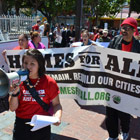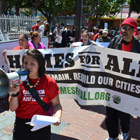
Redlined by Algorithm
A new rule proposed by Trump’s Department of Housing and Urban Development could allow landlords and real-estate brokers to get away with discrimination by blaming it on computer modeling.


A new rule proposed by Trump’s Department of Housing and Urban Development could allow landlords and real-estate brokers to get away with discrimination by blaming it on computer modeling.

Housing is a fundamental necessity, but a growing number of people are unable to afford the cost of living in major cities. To deal with the crisis, we need to roll back the financialization of housing.

Real-estate interests have long wielded an outsized influence over national housing policy—to the detriment of African Americans.

The blaze that killed a Trump Tower resident in early April recalls a long of history of developers and corporations putting profit over safety—an ethos that informs not only Trump’s business but his presidency.

The real-estate market has long profited by segregating and exploiting low-income communities of color. Expanding its reach will not solve the housing crisis.
A response to Ben Ross.

The YIMBYs pair winning political strategy with an inclusive program that will bring relief to victims of the housing crisis across the board.
A reply to Jacob Woocher and Shanti Singh.

Policy wonks left and right have sought to blame the U.S. housing crisis on local zoning regulations. But the evidence tells a different story.

A start-up turned real estate giant, WeWork has turned co-working into a global industry by selling a lifestyle where work and play are virtually indistinguishable.


By any comparison with the old Whitney, the new museum is a triumph. But can the interest shown by the wealthy in paying for museums be shifted elsewhere?

In its call for electoral democracy, the Umbrella movement sought to challenge China’s tight grip on Hong Kong politics. But Hong Kong’s protesters have yet to confront the deeper interests tying their future to that of the mainland.